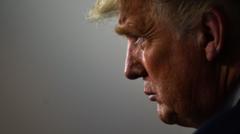In Washington D.C., the tension is palpable as Donald Trump prepares to assume the presidency once more, hoping to craft a new chapter in American history. His inauguration ceremony in the Capitol's rotunda—held indoors for the first time in decades because of the frigid temperature—will kick off his ambitious agenda intended to reshape the nation. Trump aims to sign numerous executive orders right from day one, tackling contentious issues including immigration policies and environmental regulations.
Despite the buzz of bold changes, critics express fears of authoritarianism and attacks on democracy. President Biden cautioned about a "dangerous oligarchy" developing under Trump’s administration, indicating that the potential fallout could be significant. Nevertheless, Trump’s decisive win in the November election lends him a robust mandate to act.
With an experienced and loyal team, Trump seems poised to advance his agenda more effectively than in his first term, aiming for substantial reforms such as tax cuts for the wealthy. Observers note that the Republican majority in Congress signifies a smooth path for his legislative aims.
Internal challenges do exist, particularly on the Democrat front, which remains fragmented post-election. However, many experts suggest that resistance movements are less vigorous compared to previous years. Trump may leverage support from tech billionaires like Elon Musk, Jeff Bezos, and Mark Zuckerberg—who are all expected to attend the inauguration—to bolster his policies and navigate potential obstacles.
Trump's controversial promises include mass deportations and potential pardons for those convicted from the Capitol riot. While these issues might excite his base, critics raise concerns about their practicality and impact on the economy, particularly how tariffs and immigration policies could affect pricing and labor shortages.
Ultimately, Trump's presidency is shaping up to be a dramatic journey, and as intricate policies unfold, the ripples will certainly be felt both nationally and globally.
Despite the buzz of bold changes, critics express fears of authoritarianism and attacks on democracy. President Biden cautioned about a "dangerous oligarchy" developing under Trump’s administration, indicating that the potential fallout could be significant. Nevertheless, Trump’s decisive win in the November election lends him a robust mandate to act.
With an experienced and loyal team, Trump seems poised to advance his agenda more effectively than in his first term, aiming for substantial reforms such as tax cuts for the wealthy. Observers note that the Republican majority in Congress signifies a smooth path for his legislative aims.
Internal challenges do exist, particularly on the Democrat front, which remains fragmented post-election. However, many experts suggest that resistance movements are less vigorous compared to previous years. Trump may leverage support from tech billionaires like Elon Musk, Jeff Bezos, and Mark Zuckerberg—who are all expected to attend the inauguration—to bolster his policies and navigate potential obstacles.
Trump's controversial promises include mass deportations and potential pardons for those convicted from the Capitol riot. While these issues might excite his base, critics raise concerns about their practicality and impact on the economy, particularly how tariffs and immigration policies could affect pricing and labor shortages.
Ultimately, Trump's presidency is shaping up to be a dramatic journey, and as intricate policies unfold, the ripples will certainly be felt both nationally and globally.




















